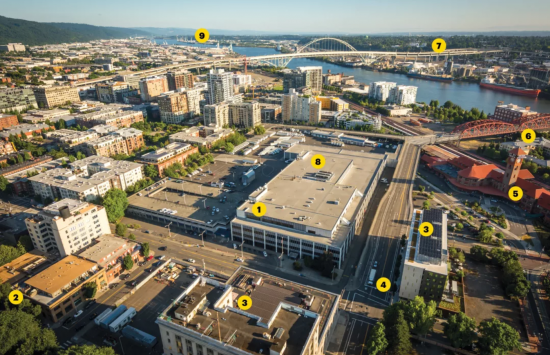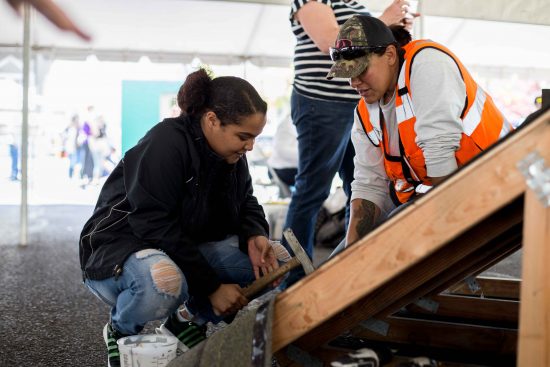Archive for March 2020
Healthy Communities Coalition: Broadway Corridor Project

Oregon Tradeswomen is committed to ensuring women, people of color, low-income communities, and other historically disenfranchised groups benefit in publicly funded projects through access to quality job training, support services, job placement support and high-wage careers.
As part of our public policy and advocacy work, Oregon Tradeswomen endorses the Metropolitan Alliance for Workforce Equity (MAWE) Community Benefits Agreement model as a policy framework for ensuring access, opportunity, and equity on all publicly funded projects, including the Broadway Corridor Project.
We are working in coalition as a member of the Healthy Communities Coalition (HCC) – a group of 20+ organizations negotiating a legally-binding Community Benefits Agreement (CBA) with Prosper Portland, Continuum Partners, and the City of Portland on the Broadway Corridor redevelopment in downtown Portland. HCC wants to ensure that the City of Portland and Prosper Portland support standard-setting new benefits to advance good jobs, affordable housing, and equity for Black, Indigenous, People of Color, and working class communities.
The Broadway Corridor is 34 acres that connects or includes landmarks and neighborhoods such as Old Town Chinatown, the Pearl District, Union Station, the Pacific Northwest College of Art and the U.S. Post Office, which will be demolished as part of redevelopment. Historically, the Broadway Corridor has been the home for communities of color who have been forcibly displaced over the past century as a result of “the effects of racialized policies, practices, and decision-making.”
The Broadway Corridor is on the land that has been home for Multnomah, Wasco, Cowlitz, Kathlamet, Clackamas, bands of Chinook, Tualatin Kalapuya, Mollala and many other tribes. Black Americans, many of them porters who arrived from Union Station, lived in, created and supported Black-owned hotels and other businesses in the early 20th century. It was once the home of to Japanese Americans until the U.S. government’s internment order in 1942 that forced these Portlanders to leave their homes and businesses.

This August, the billion dollar development is almost able to move forward after an agreement was reached on the adoption of a development deal as well as a CBA. This consensus guarantees prevailing wages, full-family health care benefits, and the significant inclusion of minority-owned contractors throughout the construction process. In addition to these terms benefiting workers, goals for 100 percent renewable energy to achieve carbon neutrality have also been included.
As the Broadway Corridor Project is in motion, the Portland Housing Bureau committed to reaching out to Black, Japanese-American, and Chinese-Americans (groups who have historically resided in these neighborhoods) offering affordable housing. This effort underscores the integrity of this project, clearly distinguishing it from previous urban developments which have dislocated minority groups.
To oversee the agreed-upon goals, a 10-member committee appointed by HCC and Prosper Portland will be monitor progress on the project – the Broadway Corridor
Oregon Tradeswomen’s Workforce Equity Manager, Jay Richmond, commented on this historic project, noting, “The successful agreement for a CBA on the Broadway Corridor represents a sea change in the way development will be done in the region going forward. We’ve made sure there is meaningful investment in creating a pipeline of opportunity for women, people of color, and working families to enter into the trades. We secured 720 units of affordable housing, family wage jobs, and small business opportunities, as well as construction hiring goals which will have huge positive impacts for BIPOC communities. That said, we know this work has just begun, and look forward to making sure these goals are met through the ongoing oversight of the BCCOC.”
While we are celebrating this positive step, the hard work isn’t over. The Portland City Council must still review and accept the agreements, and the Broadway Corridor master plan is currently under review by the Portland Design Commission. Ultimately, we are hopeful the success of these negotiations will serve as the model for future projects to intentionally bring benefits to the communities where these construction projects happen.
Dean’s Car Care: Giving Back

Oregon Tradeswomen is excited to introduce you to Dean’s Car Care and their community giving program!
Dean’s Car Care is a local car care business with an equal mix of male and female auto service professionals and they work with an underlying philosophy of education, empowerment, and community!
One of Dean’s Car Care service advisers, Harriet Hargrave, nominated Oregon Tradeswomen during a community organization presentation, and we’re thrilled to have been selected as one of four awesome organizations customers can choose to give back to when they complete their service at the shop.
“Congratulations on the great work you all are doing, we are excited to be able to support your efforts! Your organization received votes from every member of our team after Harriett lead a brief discussion on how if we want to see more women in the industry, supporting organizations like Oregon Tradeswomen is a practical step. Additionally, some of our favorite customers are graduates of your programs and have been great advocates.
—
With Appreciation,
The Dean’s Team
This program runs through June 2020, so please check them out for your next maintenance service – or if you hear a weird noise from under your hood!
Hammer and a Helping Hand
Oregon Tradeswomen rang in the New Year setting up our new home in the Rockwood neighborhood, a feat accomplished with the help of our generous supporters. To say thank you, we are shining a light on some of our business partners who made this move possible. Starting with our friends at Hammer & Hand, a local general contractor started by two Reed College graduates, Sam Hagerman and Daniel Thomas, who began their carpentry careers by remodeling historic Portland homes. Hammer & Hand has since expanded to include new home-building, commercial construction, handmade windows and doors, and executing traditional and modern designs created by the Pacific Northwest’s top architectural firms.
Because the founders developed their skills as carpenters through remodeling beautiful historic buildings, they are guided by an ethic of quality, durability, and beauty in all of their projects. Hammer & Hand has made a name for themself as a national leader in high-performance and quality-assured durability having authored two editions of their Best Practices Manual, a compendium of their field-tested construction details, many informed by their experience in high-performance passive building. A third edition of this guidebook is slated for this summer.
Hammer & Hand is a company of carpenters, and they don’t operate like a typical single-source “design-build” firm. Instead, their process involves partnering with an independent architect and getting the design team, the general contractor, and client together in a dynamic collaborative process that ensures a well-rounded approach to the project to satisfy budget, aesthetics, and buildability. Hammer & Hand’s goal is to makes each clients’ dreams a reality while building to last.

Their commitment to great work doesn’t end here. Hammer & Hand is dedicated to empowering their employees. Because of their commitment to workforce happiness, Hammer & Hand sees very little employee turnover and has team members who have been with the company for a long time, including career carpenters who have celebrated 15 and 20 year anniversaries over the past few years. Hammer & Hand is also committed to workplace diversity and actively hires women – including a few Oregon Tradeswomen graduates!
Hammer & Hand demonstrates their commitment to Oregon Tradeswomen’s mission not only by giving our graduates an exceptional place to grow in their careers as carpenters, but they made an incredibly generous donation to helping us acquire a training space of our own. Oregon Tradeswomen’s new headquarters in Rockwood, complete with classroom and workshop, allows us the capacity to expand our training to serve more women in more ways. We are grateful for Hammer & Hand’s investment in our growth as an organization and we look forward to the bright future we are building together.
